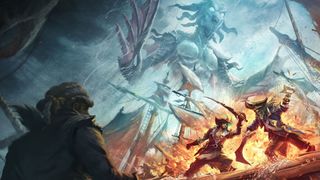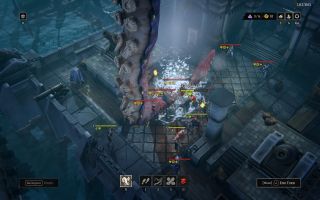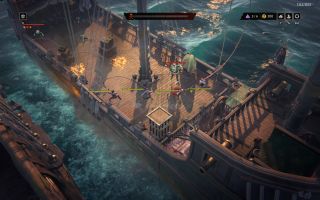Rogue Waters is a cross between Pirates of the Caribbean, Slay the Spire, and XCOM
Don't get it confused with Rouge Waters, a different game that's about makeup application on the high seas.

Pirates are like vampires—they should make perfect videogame protagonists, but there are only a handful of genuinely good games about them. It's tricky because we want such specific things from them. The ideal pirate game in my head is a raid-and-trade game of battle on the high seas, but also one of portside economic simulation; broadside-maneuvering but also dueling on storm-tossed decks.
Rogue Waters isn't that imaginary game. It's something altogether different.
The word "rogue" isn't just in the title to suggest the presence of rapscallions and rascals, though of course they are present and accounted for. Rogue Waters is a run-based roguelite, and each raid you and your crew undertake follows a map straight out of Slay the Spire. You're choosing a branch not just because you think you can take the elite Glass Trader ship it's presenting you with, but because it puts you on the path that leads to an armory you want to shop at. Whether you die or win the final battle of the raid, usually against a well-defended fortress, you'll be back at base where you can upgrade your ship and crew—as well as whatever friendly sea monsters you've unlocked so far—before setting off on another raid.
While the nodes on those paths include choose-your-own-adventure stories where you deal with trap-filled treasure islands or injured sea beasts, a lot of them are ship battles. These play out in two phases. The first sees you trading cannon fire for three rounds, trying to take out whatever artillery is aimed at your crew or upgrades while destroying, say, the rum barrels that will give your opponent's crew a point of regeneration every turn.
Once that's over you swing across to their deck to take them on turn-based-tactics-style. While there's no flanking and cover is only important for breaking sightlines, positioning matters because almost every attack is a pushback, and making enemies bump into objects—or each other—causes extra damage. Defeating someone with a shove over the railing and into the drink is real satisfaction.
Pulling off that kind of thing would be a cinch if you could sprint from one end of the deck to the other but most pirates can only move two squares—or one if they start the turn engaged in combat. To get around you have to make careful use of ropes, which let you fly up to eight extra squares for free, and the commander ability that lets your captain bully a crewmate into running two more squares, the lazy git. It's a deck-top dance where most of the moves are the old stab-and-shove, and it feels great to get into the rhythm of it.

One complication is the sea monsters, a menagerie of legendary beasts you gain control of and that can be summoned to perform a powerful special move at the cost of something called abyssal ether. You begin with the Kraken, whose tentacle can flatten five swabbies if they're foolish enough to stand in a row, with more animal friends gained over the course of the story.
The biggest gaming news, reviews and hardware deals
Keep up to date with the most important stories and the best deals, as picked by the PC Gamer team.
Different varieties of pirate also have their own skill trees. While the refillable mass of your crew are basic mates, you can also recruit randomized individuals from classes like the spearmaiden, who can stab two enemies at once, or the musketeer, who has a rare ranged weapon that has to be aimed for a turn before firing a high-damage shot.
While it's not quite the pirate game of my dreams—there's no trading, with chests of plunder being turned into abstract points to be spent on upgrades between raids, a procedurally generated crew who don't feel like real companions, and at no point do you even have to think about wind direction—there's plenty to like about Rogue Waters. The puzzle of swapping cannonballs is a succinct prelude to each fight, and there are enough moving pieces in combat to let you feel like you've really made a difference when you line up a turn's worth of actions to take out a bunch of high-value opponents—maybe by throwing their own bombs back at them or just bouncing the scurvy dogs off each other till they all fall down.

There's a generous undo option too, which lets you take back a turn if you misclicked and accidentally prepared a defense instead of unleashing an attack, or didn't realize you'd be ending a turn standing in some tar rather than on open deck.
The scope seems deliberately limited to fit a smaller studio's budget (it's the work of Ice Code Games, previously responsible for the excellent Hard West 2), but though it's not as deep as some other roguelites, it's plenty of fun to splash around in the shallows sometimes too.

Jody's first computer was a Commodore 64, so he remembers having to use a code wheel to play Pool of Radiance. A former music journalist who interviewed everyone from Giorgio Moroder to Trent Reznor, Jody also co-hosted Australia's first radio show about videogames, Zed Games. He's written for Rock Paper Shotgun, The Big Issue, GamesRadar, Zam, Glixel, Five Out of Ten Magazine, and Playboy.com, whose cheques with the bunny logo made for fun conversations at the bank. Jody's first article for PC Gamer was about the audio of Alien Isolation, published in 2015, and since then he's written about why Silent Hill belongs on PC, why Recettear: An Item Shop's Tale is the best fantasy shopkeeper tycoon game, and how weird Lost Ark can get. Jody edited PC Gamer Indie from 2017 to 2018, and he eventually lived up to his promise to play every Warhammer videogame.

Caves of Qud, our favorite science fantasy roguelike where you can clone, befriend, and eat yourself, is leaving early access in December after 15 years of development

There's always one Steam Next Fest demo that inexplicably takes over my life, and this time it's this bizarre roguelike that mashes up Balatro with pachinko
Most Popular



